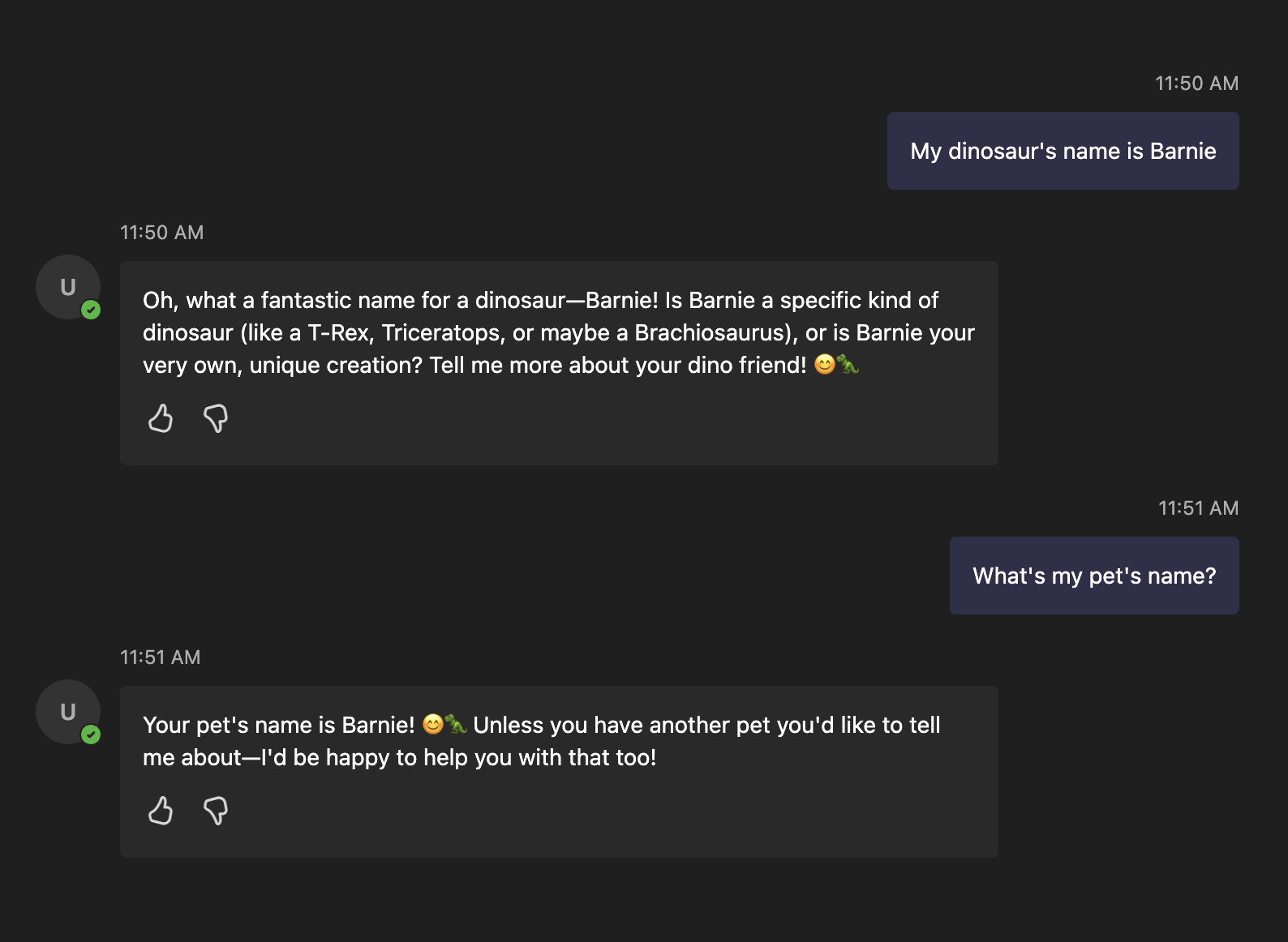Keeping State
By default, LLMs are not stateful. This means that they do not remember previous messages or context when generating a response. It's common practice to keep state of the conversation history in your application and pass it to the LLM each time you make a request.
By default, the ChatPrompt instance will create a temporary in-memory store to keep track of the conversation history. This is beneficial
when you want to use it to generate an LLM response, but not persist the conversation history. But in other cases, you may want to keep the conversation history
By reusing the same ChatPrompt class instance across multiple conversations will lead to the conversation history being shared across all conversations. Which is usually not the desired behavior.
To avoid this, you need to get messages from your persistent (or in-memory) store and pass it in to the ChatPrompt.
The ChatPrompt class will modify the messages object that's passed into it. So if you want to manually manage it, you need to make a copy of the messages object before passing it in.
State Initialization
Here's how to initialize and manage conversation state for multiple conversations:
using Microsoft.Teams.AI;
using Microsoft.Teams.AI.Messages;
using Microsoft.Teams.AI.Models.OpenAI;
using Microsoft.Teams.AI.Prompts;
using Microsoft.Teams.AI.Templates;
using Microsoft.Teams.Api.Activities;
using Microsoft.Teams.Apps;
// Simple in-memory store for conversation histories
// In your application, it may be a good idea to use a more
// persistent store backed by a database or other storage solution
private static readonly Dictionary<string, List<IMessage>> ConversationStore = new();
/// <summary>
/// Get or create conversation memory for a specific conversation
/// </summary>
public static List<IMessage> GetOrCreateConversationMemory(string conversationId)
{
if (!ConversationStore.ContainsKey(conversationId))
{
ConversationStore[conversationId] = new List<IMessage>();
}
return ConversationStore[conversationId];
}
/// <summary>
/// Clear memory for a specific conversation
/// </summary>
public static Task ClearConversationMemory(string conversationId)
{
if (ConversationStore.TryGetValue(conversationId, out var messages))
{
var messageCount = messages.Count;
messages.Clear();
}
return Task.CompletedTask;
}
Stateful Chat Example
/// <summary>
/// Example of stateful conversation handler that maintains conversation history
/// </summary>
public static async Task HandleStatefulConversation(OpenAIChatModel model, IContext<MessageActivity> context)
{
// Retrieve existing conversation memory or initialize new one
var messages = GetOrCreateConversationMemory(context.Activity.Conversation.Id);
// Create prompt with conversation-specific memory
var prompt = new OpenAIChatPrompt(model, new ChatPromptOptions
{
Instructions = new StringTemplate("You are a helpful assistant that remembers our previous conversation.")
});
// Send with existing messages as context
var options = new IChatPrompt<OpenAI.Chat.ChatCompletionOptions>.RequestOptions
{
Messages = messages
};
var result = await prompt.Send(context.Activity.Text, options);
if (result.Content != null)
{
var message = new MessageActivity
{
Text = result.Content,
}.AddAIGenerated();
await context.Send(message);
// Update conversation history
messages.Add(UserMessage.Text(context.Activity.Text));
messages.Add(new ModelMessage<string>(result.Content));
}
else
{
await context.Reply("I did not generate a response.");
}
}
Usage in your application
teamsApp.OnMessage(async (context) =>
{
await HandleStatefulConversation(aiModel, context);
});
How It Works
- Conversation Store: A dictionary maps conversation IDs to their message histories
- Per-Conversation Memory: Each conversation gets its own isolated message list
- Request Options: Pass the message history via
RequestOptions.Messageswhen callingSend() - Automatic Updates: After receiving a response, manually add both the user message and AI response to the store
- Persistence: The conversation history persists across multiple user interactions within the same conversation
The ChatPrompt.Send() method does not automatically update the messages you pass in via RequestOptions. You must manually add the user message and AI response to your conversation store after each interaction.
In a production application, consider using a more robust storage solution like Azure Cosmos DB, SQL Server, or Redis instead of an in-memory dictionary. This ensures conversation history persists across application restarts and scales across multiple instances.
